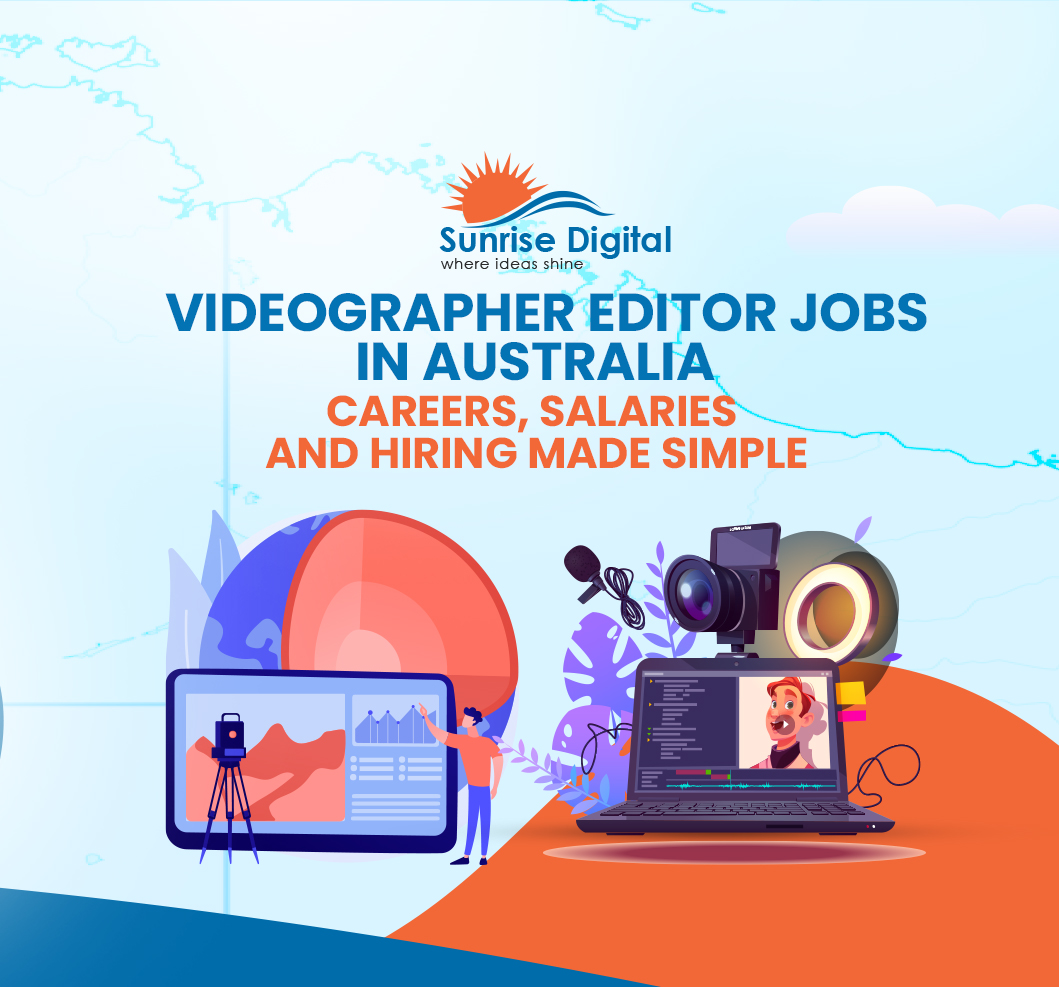Finding the right videographer editor jobs can be confusing if you don’t know what to expect. Australian businesses are producing more video than ever before, and the demand for skilled professionals who can both shoot and edit is growing fast. Whether you’re searching for a career move or you run a business looking to hire, the opportunity is right here in front of you.
For job seekers, this field offers flexibility with remote roles, freelance work, and full-time positions across industries. From marketing agencies in Melbourne to production studios in Sydney, companies want talent that can capture attention and turn raw footage into compelling stories.
If you’re a business owner, hiring the right videographer and editor could be the difference between content that blends in and content that converts. That’s why many brands partner with agencies like Sunrise Digital Media to access professional video editing services without the long recruitment process.
Why Videographer Editor Jobs Are in Demand?
Video has become the most powerful way for brands to connect with audiences. In Australia, businesses of every size are shifting budgets from traditional advertising to digital video campaigns. That shift means videographer and editor jobs are opening across industries, from e-commerce to education.
Short-form content is leading the trend. Platforms like TikTok, Instagram Reels, and YouTube Shorts reward businesses that can produce engaging clips quickly. That’s why companies need professionals who can handle both shooting and editing. Instead of hiring separate roles, many employers now prefer hybrid skills wrapped into a single position.
Remote opportunities are also expanding. Many brands outsource projects overseas or look for remote video editor jobs worldwide, making competition high but also broadening the market. At the same time, Australian employers are offering flexible options for those who want to work from home.
For freelancers, this is a chance to secure consistent contracts. Freelance videographer editor jobs let skilled editors work with multiple clients, often earning more than traditional staff roles. For businesses, it’s an opportunity to tap into creative talent without committing to a full-time hire.
Common Job Titles and Types for Videographer and Editor
Not every role is advertised the same way. Employers often use different titles even when the responsibilities are similar. Understanding these variations helps candidates apply for the right positions and helps businesses attract the right talent.
One of the most common roles is the videographer and editor job description that combines both shooting and editing. This hybrid role is especially popular with small businesses and agencies that want one person managing the full production process.
Some listings focus on video editor and videographer jobs that lean more heavily on post-production. These positions are ideal for editors skilled in Adobe Premiere Pro, Final Cut Pro, or DaVinci Resolve who can turn raw footage into professional-quality videos.
Location also influences how jobs are described. Companies in larger cities often advertise videographer editor jobs Melbourne or Sydney-based roles, while international postings may highlight videographer editor jobs in Dubai for industries like fashion and hospitality.
Freelancing is another growing area. Many organisations prefer hiring contractors for specific campaigns. Searching for freelance videographer editor jobs can uncover opportunities with marketing agencies, start-ups, and even corporate training providers.
For businesses, clear titles attract stronger candidates. A posting that spells out whether the focus is on filming, editing, or both reduces mismatched applications and helps projects move faster.
Typical Responsibilities of A Videographer Editor
Every listing will come with its own details, but most videographer editor job descriptions include similar responsibilities. Here is the list of the most common ones.
✅ Managing End-to-End Video Projects
Most videographer editor job descriptions expect candidates to handle projects from start to finish. This means combining technical skills with creative vision to deliver polished content.
✅ Filming and On-Site Production
On the production side, tasks often include setting up cameras, adjusting lighting, capturing audio, and directing talent. The ability to plan shoots and solve problems quickly separates beginners from professionals. For businesses, this ensures reliable and consistent video quality.
✅ Editing and Post-Production
A job description for a videographer editor usually requires experience in cutting footage, colour grading, and adding graphics or subtitles. Editors often blend audio tracks, clean background noise, and create smooth transitions so the final video looks professional.
✅ Team Collaboration and Deadlines
Collaboration is a core responsibility. A job description of a videographer and editor may include working with creative directors, marketing teams, or business owners. Editors are often required to manage deadlines, export files in multiple formats, and ensure content matches brand guidelines.
✅ Specialised Roles and Industry Focus
Some videographer video editor job descriptions focus on short-form social media content, while others prioritise corporate training or advertising projects. The mix of duties depends on the employer and industry.
📌 Why This Matters for Employers and Candidates?
For employers, understanding these responsibilities helps in writing clearer job ads. For candidates, it highlights the skills they should showcase in their portfolios. Agencies like Sunrise Digital Media provide ready-to-go professionals who already meet these requirements, reducing the risk of poor hires.
👉 Start your video project today — book a free discussion with Sunrise Digital Media.
Essential Skills and Qualifications for Videographer Editor Jobs
A successful candidate for a videographer editor job needs both technical know-how and creative vision. Here are the details to follow.
✓ Technical Editing Expertise
A successful candidate for a videographer editor job must have strong technical knowledge. Employers expect fluency in industry-standard tools such as Adobe Premiere Pro, Final Cut Pro, After Effects, and DaVinci Resolve. These programs are essential for editing and motion graphics.
✓ Filming and Production Knowledge
Beyond software, practical filming skills are vital. A job description for videographer editor often highlights the need for camera operation, lighting control, and sound management. These abilities ensure the footage is strong before editing even begins.
✓ Creative and Soft Skills
Soft skills matter just as much as technical expertise. Storytelling, time management, and adaptability help editors meet deadlines while creating videos that connect with viewers. For businesses, this means campaigns that engage audiences instead of wasting resources.
📍 Market Value in Australia
In Australia, candidates who demonstrate advanced editing skills can secure higher-paying roles. Many video editor jobs in Australia now require portfolios that showcase both corporate projects and social media clips. Versatility is often what gets candidates noticed.
Salary and Job Market Overview of A Videographer and Video Editor
When considering videographer editor jobs’ salary, the numbers vary depending on location, experience, and project scope. In Australia, the average annual salary sits between $55,000 and $90,000. Junior editors usually earn closer to the lower end, while experienced professionals in big cities can reach the top of that range.
Freelancers often work on an hourly basis. Rates for contract editors in Australia generally range from $25 to $60 per hour, with higher fees for specialists in animation or colour grading. This flexibility makes freelance work appealing, but it can also make budgeting tricky for businesses.
Globally, demand is strong. Many video editor jobs in Australia listings highlight remote options, giving local candidates a chance to compete with international talent. Employers in sectors like advertising, e-commerce, and corporate training are especially active in hiring hybrid videographer editor roles.
For businesses, salaries are only part of the cost. Recruitment, training, and turnover add to the expense. That’s why many brands now choose to partner with agencies like Sunrise Digital Media. This approach ensures immediate access to experienced professionals without the ongoing employment overheads.
How to Apply for Videographer Editor Jobs: A Step-by-Step Guide
Getting a videographer or video editor job takes more than technical skills. Employers want proof that you can deliver quality content on time. Here is a proper step-by-step guide on how to apply for videography related jobs.
Step 1: Build a Strong Portfolio
Landing a videographer editor job starts with a professional portfolio. Include a mix of projects such as corporate videos, short-form social media clips, and brand campaigns. A varied portfolio shows you can adapt to different industries and client needs.
Step 2: Tailor Your Resume to the Role
A job description of a videographer and editor usually highlights both filming and editing. Your resume should reflect this dual skill set. List the editing software you’ve mastered, the types of projects you’ve worked on, and measurable results like boosting engagement or driving sales.
Step 3: Search Locally and Online
Look for opportunities by searching videographer editor jobs near me on job boards and company websites. In Australia, many roles are also posted on LinkedIn, Indeed, and creative networks. For remote or freelance positions, global platforms open even more doors.
Step 4: Create a Tailored Showreel
To stand out, prepare a one-minute showreel that highlights your best work. Tailor it for each application, showing exactly how your skills match the employer’s needs. A strong video sample speaks louder than a resume.
Step 5: Consider Outsourcing Opportunities for Businesses
For employers, hiring can take time and comes with risk. That’s why many companies now partner with agencies like Sunrise Digital Media. We connect businesses with skilled editors and videographers who deliver professional content from day one.
👉 Let’s talk about your video goals. Connect with Sunrise Digital Media for a free project consultation.
Tips for Employers Hiring Videographer Editors
Hiring for a videographer or a video editor can be challenging if you are not clear on what you need. Follow these tips to make the hiring process easier.
Tip 1: Write a Clear Job Description
Hiring for a videographer and editor job description is easier when the ad clearly states whether the role covers filming, editing or both. Clear wording reduces mismatched applications and speeds up the hiring process.
Tip 2: Decide Between Full-Time and Freelance
Not every project requires a permanent hire. For seasonal campaigns or short projects, freelance videographer editor jobs are often the most cost-effective choice. Contracting lets you access talent without long-term commitments.
Tip 3: Offer Flexibility to Attract Top Talent
Many applicants now search for videographer editor jobs remote. Providing hybrid or work-from-home options can help you secure stronger candidates. Always include deliverables, tools, and turnaround times to set expectations.
Tip 4: Consider Outsourcing for Faster Results
Still, the hiring process can be slow. Training new staff takes time and often pulls resources away from running the business. This is where video outsourcing can save money and effort.
At Sunrise Digital, we provide companies with ready-to-go professionals who handle everything from filming to final edits, delivering results without the recruitment headache.
Why Outsourcing Video Editing Makes Sense for Australian Businesses?
For organisations, training and recruitment can be costly and time-consuming. Outsourcing removes these barriers. These are the reasons why video outsourcing is a must-do thing for your business.
✔️ Access to Industry-Leading Expertise
Outsourcing video editing gives you immediate access to skilled professionals who know the latest editing techniques, storytelling trends, and platform demands. This ensures your videos stay competitive.
✔️ Cost Efficiency and Predictable Budgeting
Keeping an in‑house video team comes with regular salary, training, software, equipment, and overhead costs. Outsourcing saves money by paying only for what you need—when you need it.
✔️ Faster Turnaround and Scalability
Professional editing agencies work around the clock and can handle tight deadlines. Whether it’s one video or a series, outsourcing offers the flexibility to scale up or down quickly.
✔️ Consistent Quality Across All Content
When you outsource, you tap into workflows that maintain brand consistency—from tone and transitions to colour grading—across every video, no matter how many you’re producing.
✔️ Fresh Creative Perspective
External teams bring new ideas and creative insights from varied industries. This creative objectivity keeps your content fresh and engaging.
✔️ Reduced Stress and Simplified Workflow
Managing video in‑house can be stressful—from meeting deadlines to technical challenges. Outsourcing shifts those responsibilities to professionals who deliver polished results consistently.
Partnering with Sunrise Digital is a smarter move. Our fully trained professionals bring these skills on day one, ensuring polished video content without delays.
Last Few Words
The demand for videographer editor jobs in Australia is only growing. Businesses want professionals who can film, edit, and deliver content that captures attention. Job seekers who build strong portfolios and master editing software will find plenty of opportunities both locally and remotely.
For companies, the challenge lies in hiring the right talent quickly. Instead of navigating long recruitment cycles, many brands now rely on Sunrise Digital Media for expert video editing and production services. If you want content that drives results, our team is ready to create it for you.
👉 Turn your vision into powerful content — discuss your video project with Sunrise Digital Media at no cost.
Frequently Asked Questions About Videographer Editor Jobs
A videographer editor's job involves filming video content and editing it into a polished final product. This includes setting up cameras, adjusting lighting, capturing audio, and using editing software to produce videos that match a brand’s style.
A videographer mainly focuses on filming and capturing footage, while a video editor works with that footage to create the final video. Many modern roles combine both skills into one position.
Videographer and editor jobs require filming skills, knowledge of lighting and sound, and proficiency in editing programs like Adobe Premiere Pro or Final Cut Pro. Strong storytelling, time management, and creativity are also essential.
Most videographer editor jobs don’t require a formal degree. Employers value hands-on experience, a strong portfolio, and proven skills with editing software more than formal education.
In Australia, industries like marketing, e-commerce, education, events, and media production hire videographers and editors. Businesses of all sizes now invest in video content to reach their audiences.
The average salary for videographer editor jobs in Australia ranges from $55,000 to $90,000 a year. Freelance editors may charge between $25 and $60 per hour, depending on their experience and the project type.
Yes, many videographer editor jobs are remote. Employers often hire editors to work from home, especially for social media content, YouTube videos, and freelance client projects.
Freelance videographer and editor jobs are available on platforms like Upwork, Fiverr, and Indeed. Businesses also work with agencies such as Sunrise Digital Media for ongoing professional editing support.
Yes, many videographer editor jobs are remote. Editors often receive footage online, edit from home, and deliver final videos digitally. This setup is common for freelance and agency roles.
Outsourcing saves time and reduces risk. Agencies like Sunrise Digital provide skilled editors and videographers who deliver professional videos without the overhead of recruitment or training.



